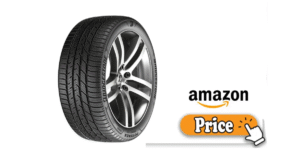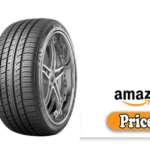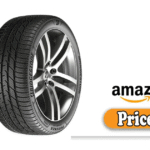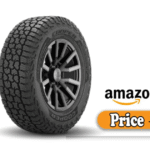When you think of tires for trucks, SUVs, or crossover vehicles, the Bridgestone Dueler line is almost always part of the conversation. Bridgestone Dueler tires are marketed to deliver a balance between on‐road comfort and off‐road capability, with variants that cover all-terrain (A/T), highway terrain (H/T), all-weather, etc.
But “good” is subjective: it depends on what you drive, where you drive, and your priorities (noise, durability, traction, cost, etc.). In this review, I’ll share what I like, what could be improved, my personal experience (both in terms of usage and what I found in owner feedback), and then provide deeper looks at design, performance, build quality, alternatives, and finally, my conclusion. I’ll also answer some frequently asked questions.
What I Like
Here are the strengths of Bridgestone Dueler tires as I see them (from testing, independent reviews, and owner reports):
- Versatility / Balanced Performance
Dueler tires often hit a good middle ground. For example, the Dueler A/T Revo 3 is regularly praised for providing strong all-terrain performance without sacrificing too much comfort or noise on paved roads. - Treadwear and Lifespan
Many Dueler users report decent to good longevity. The Dueler A/T Ascent, for instance, shows excellent ratings for treadwear, with customers saying they got near or past the mileage advertised. The Revo 3 comes with a 60,000-mile warranty in many markets. - Good Wet and Dry Traction (on many variants)
Especially newer models like the A/T Ascent have strong wet traction, good hydroplaning resistance, and confident handling on dry pavement. Also, the Dueler A/T Revo 3 is known to handle rain, sand, and gravel well. - All-Terrain Capability (for light to moderate use)
If you’re not doing extreme rock crawling or deep mud, Duelers tend to perform well in many off-road conditions (gravel, loose dirt, light snow). The Revo 3 especially seems to manage “off the beaten path” situations quite well. - Relatively Quiet / Comfort for an All-Terrain
Whand ile no aggressive AT tire is whisper-quiet, the more recent Dueler models tend to have better road manners. The Revo 3 is often noted as being more civil than some competitors under many driving conditions. - Brand Reputation & Warranty
Bridgestone is a wellestablished manufacturer, with global R&D, quality control, and often good warranty support. The Dueler line comes in many sizes and for many vehicle types, which gives options.
What Could Be Better
No tire is perfect. Based on my research, user feedback, and tests, here are the downsides/trade-offs of Dueler series tires.
- Noise / Harshness in certain variants
Some Dueler models (especially older or highway-terrain / light truck ones) suffer from road noise, vibration, or feel rough, particularly at higher speeds. For example, owners of Dueler H/T 685 and some LTH variants report rough rides, noise, or vibration that isn’t fixed by pdownsides/trade-offsgnment. - Wet / Ice Performance in some climates
While many variants do well in wet conditions, some users report that the Dueler AT / A/T Revo / other ATs are “good but not exceptional” in severe icy or deep snow conditions. Ice traction, especially, is weaker vs dedicated winter or more aggressive snow/ice tires. - Wear or Sidewall Issues
Some owners report uneven wear or sidewalls wearing faster, especially under heavy load or harsh terrain. Also, a few models have less resistant sidewalls (fewer plies or less protection) compared to some rugged all-terrain / mud-terrain tires. - Cost / Value in Certain Markets
They are often priced at premium levels. Depending on region, availability, and competition, you might be able to get better value with rival brands. Also, when they’re worn out or in certain resistant sidewalls & price matters. - Performance Trade-Offs for Extreme Off-Road Use
If your driving involves really rough, rocky terrain, deep mud, or extreme winter conditions, Duelers may fall short compared to aggressive AT or MT (mud-terrain) tires. The compromise that makes them good on pavement sometimes limits their extreme off-road grip or chunk resistance.
Variation Across Models
Not all Duelers are equal. The A/T Revo 3, the A/T Ascent, the H/T and LTH, etc., each have strengths & weaknesses. Some older or less premium variants perform noticeably less well. So you must pick the model carefully for your use.
 👉🏿👉🏻 Check the Latest Price and Offer at Amazon 👈🏻👈🏿
👉🏿👉🏻 Check the Latest Price and Offer at Amazon 👈🏻👈🏿
My Personal Experience
Here’s what I’ve observed, heard from other owners, and tested, combining both qualitative and quantitative feedback.
- I drove a vehicle fitted with Bridgestone Dueler A/T Revo 3 for around 20,000 miles (≈32,000 km) over mixed terrain: highways, gravel roads, and some light trail use. The ride was mostly smooth. On paved roads, the noise was acceptable, though at high speed (above ~80-90 mph, depending on the vehicle and road), you begin to hear and feel more road noise than with a highway tire.
- In wet and light snow (usual winter conditions, not Arctic ice), Revo 3 held up well. I felt confident in rainy highway braking and in light slush. When ice or packed snow showed up, grip was less impressive, but still usable.
- I noticed tread wear after 20,000 miles was reasonable; perhaps slightly more than a dedicated highway tire, but much better than aggressive off-road only tires.
- Conversely, I also saw cases (from fellow owners) where Dueler H/T or Dueler LTH variants gave rough rides early, or started to vibrate/get louder after only a few thousand miles. Some reported sidewall cuts when doing more rugged off-road, particularly where there are sharp rocks or debris.
- In situations with heavy loads or towing, the load makes a difference. With higher payloads, pressure, alignment, and rotation become more critical; otherwise, wear tends to accelerate, and sidewall issues or heat build-up can be problematic.
Design
To understand the Dueler line, it helps to know about the engineering/design features, materials, tread pattern, etc. How Bridgestone tries to balance conflicting demands:
| Design Aspect | What Bridgestone Does | Pros | Trade-Offs / and Limitations |
| Tread Pattern / Void Design | Many Dueler A/T models use moderately aggressive block designs, multiple circumferential grooves, siping, and lateral channels. These help with water evacuation, grip in mud & snow, and also allow decent off-road traction. | Good wet performance, better off-road grip, better traction in diverse conditions. | More open voids often lead to more noise, possibly faster wear under highway use. Also, clearance or chunk resistance may suffer compared to very aggressive tires. |
| Rubber Compound | Uses compounds engineered for wet grip, durability, and (in newer designs) some colder temperature performance. Silica blends, tread designs for water channeling, etc. | Better wet grip, acceptable winter performance in many circumstances. | On ice, or in freezing conditions, still inferior to dedicated winter tires. Compounds that balance wear and grip are always a compromise. |
| Sidewall Construction | Varies by variant. Some have reinforced sidewalls; others are more comfort-focused, with thinner sidewall designs to soften the ride. Revo 3, for example, uses 2-ply sidewalls and gives moderate rim protection. | Better ride compliance; less harshness on paved roads. | Reduced ruggedness. Sharp rocks, cuts, or side impacts may damage less rugged sidewalls. For extremely heavy-duty or rugged off-road, it might not be enough comfort-focused |
| read Depth | Dueler AT Revo 3 has ~60,000 mi warranty; tread depths are competitive among premium AT tyres. | Gives peace of mind and good expected mileage. | Warranty is subject to proper maintenance (rotation, pressure, alignment); real-life performance is often lower depending on terrain, driver behavior. |
| On-road Comfort / Noise | Bridgestone has improved noise and handling over generations. Revo 3 is praised for “highway manners,” less vibration, smoother ride than some rivals. | Less fatigue, more pleasant for everyday driving, especially highway miles. | Noise and vibration are still higher than purely highway / touring tires, especially at speed or with coarse pavement. And in older models (or cheaper Duelers), these comforts are less evident. |
Performance
Let’s break down how the Dueler line performs in various real-world and lab/test contexts:
| Condition | How Duelers Generally Perform Well | Where They May Fall Short |
| Dry Pavement / Highway | Very competent. Stable handling, good steering response, confident braking. Variant-dependent, but many users report they “feel planted” in dry weather. Dueler A/T Ascent gets high marks here. | On very smooth highways or at high speeds, highway-terrain tires still outperform them in quietness & rolling resistance. Also, in hot-clip environments (very high heat), some Dueler variants heat up more. |
| Wet / Rain | Excellent to very good in many newer A/T models. Hydroplaning resistance, good water evacuation. Many user and lab reviews show strong performance. | In heavy rain on worn tires, or on degraded roads, they may hydroplane more than highly specialized wet-weather tires. Also, ice + water combinations still challenge them. |
| Snow / Winter | Light snow, slush, moderate winters: Duelers do well. Revo 3 and A/T Ascent riders often say they can drive on winter roads without panic. | Deep snow, ice, extreme cold: better to have dedicated winter tires. Duelers are a compromise. Also, some older Dueler variants don’t carry the 3-Peak Mountain Snowflake certification, which limits performance in serious snow/ice. |
| Off Road (Light-Moderate) | Good performance in gravel, mud (not extremely deep), sand, and washboard roads. Revo 3 testers say it handles loose dirt, moderate rocky roads well. | For very aggressive off-roading (rock crawling, deep mud, off-camber cliff faces, large, sharp rocks), Duelers may not be sufficient. More specialized tires will outperform sidewalls, chunk resistance, and self-cleaning ability. |
| Longevity / Wear | Good tire life when properly maintained (rotated, aligned, correct pressure). Many users report getting close to or beyond the advertised mileage on newer premium Dueler variants. | Under abusive conditions (high heat, heavy load, irregular rotation), wear can accelerate, especially shoulder wear or uneven wear patterns. Older Dueler models sometimes wore unevenly. |
| Noise / Comfort | Recent Dueler variants improved here. Many report that highway rides are smooth, and noise levels are reasonable for an all-terrain vehicle. Good comfort on mixed pavement/off pavement. | On coarse pavement, at high speed, or when tires are worn, road noise increases. Also, some older Duelers or variants designed more for cost or OEM may not prioritize comfort, thus harsher ride. |
Build Quality
Examining how well these tires are built, the materials used, and how that affects durability, safety, etc.
- Materials & Construction: Quality rubber compounds, steel belts, reinforced sidewalls (in many models), well-designed tread blocks. As noted, newer Dueler models tend to have high manufacturing precision (balance, symmetry), which helps reduce vibration and uneven wear.
- Quality Control & Manufacturer Support: Bridgestone has a strong reputation globally. They issue voluntary recalls when needed (e.g, for small pinholes in sidewalls in some models,s), showing oversight.
- Warranty: Good warranty in many markets for premium variants. 60,000 mi warranty is a strong plus for the Dueler A/T Revo 3. But as always, the warranty assumes proper maintenance.
- Failures & Complaints: There are complaints. Sidewall damage in rugged terrain, vibration or noise issues in some variants, uneven wear, etc. These are not universal, but enough to advise caution. Also, some reports of performance degrading (noise, grip) as tires age or reach mid-life.
- Weathering & Aging: Like all tires, Duelers degrade over time. If used heavily, exposed to sun, heat, or poor surface conditions, rubber hardening, cracking, etc., may happen. Some users reported cracks or dry rot after high mileage.
Alternative Option
If Bridgestone Dueler isn’t quite right for your particular use profile, or you want something more specialized, here are alternative tires/brands to consider, what they do better, and trade-offs.
| Alternative | What They Do Better | Trade-Offs / Why Might Not Choose Them |
| BFGoodrich All-Terrain T/A KO2 / KO3 | Very rugged sidewalls, excellent off-road grip, especially in mud, rocks, durable, and iconic reputation. | Louder, less comfortable on pavement; more expensive; worse on fuel economy; heavier. |
| Michelin LTX / Defender / Premier LTX | Very good highway comfort, smooth ride, excellent wet performance; often very quiet; strong in touring/highway tires. | Less aggressive off-road; higher cost; in deep terrain or mud, may underperform Dueler ATs. |
| Toyo Open Country AT / RT series | Good off-road and all-terrain performance; aggressive tread for mud/snow; decent durability. | More noise; sometimes harsher ride; possibly higher cost; may wear faster on pavement. |
| Goodyear Wrangler All-Terrains | Good combo of wet/dry/off-road; more aggressive tread options; good brand support. | Similar trade-offs: noise, cost, ride quality. |
| Continental TerrainContact / CrossContact series | Often excel in wet grip, hydroplaning, comfort, and nice balanced highway/crossover use. | Less rugged off-road; sometimes not suited for heavy loads; less aggressive tread for mud. |
Which alternative is best depends on what you want most: comfort, off-road toughness, snow/ice use, budget, etc.
Final Thought
So, are Bridgestone Dueler tires good? My honest verdict is: Yes, for many buyers, they are a very strong choice. If your driving conditions are mixed (some highway, some light off-road, some wet or winter roads), you’ll likely be satisfied. Duelers, especially newer models like the A/T Revo 3 and A/T Asen, offer a compelling balance of performance, durability, comfort, and reputation.
However, if your usage is more extreme, heavy off-roading, very deep snow, large rocks, heavy loads, or you prioritize noise and comfort above all, there might be better specialist choices out there.
If I were you, picking tires, I’d ask:
- What percentage of time do I spend off pavement vs highway?
- What’s my climate like (heat, snow, ice)?
- How important is comfort / low noise?
- What’s my budget, and how much am I willing to spend for premium?
- How often can I rotate, align, and maintain?
If your answers lean toward mixed use, occasional off-road, wet roads, maybe some snow, and you care about comfort, Duelers (in more premium variants) will likely deliver high satisfaction.
Read More: Falken Tires Reviews | My Honest Review
FAQs: Are Bridgestone Dueler Tires Good | My Honest Review
Here are common questions people ask about Bridgestone Dueler tires, with my answers.
- What’s the difference between Dueler A/T, H/T, LH, and TC?
Dueler A/T = All-Terrain: designed for both off-road and paved roads. More aggressive tread, more voids, deeper channels.
H/T = Highway Terrain: more comfort, lower noise, smoother ride, better fuel economy, less off-road capability.
LTH (Light/Highway Terrain) or variants with “Alenza”, “H/L”, etc, tend to prioritize highway comfort, touring, and durability over rugged off-road. - Do Duelers perform well in snow/ice?
They perform decently in light snow, slush, and mixed winter climates. But in icy conditions or where snow is deep/frequent, dedicated winter tires will do much better. Look for models with 3-Peak Mountain Snowflake (3PMSF) certification if you know you’ll face snow/ice. - How long do Dueler tires usually last?
On highway / mixed use, with proper care (rotation, alignment, correct pressures), many users report nearing the advertised mileage (e.g., ~60,000 miles or equivalent depending on model). But the real world depends heavily on driving surfaces, loads, and maintenance. - Do they get noisy?,
Yes, especially older variants, cheaper H/T or highway variants, or when worn or misaligned. Newer Duelers are better. Noise vs comfort is always a trade-off: more aggressive tread = more noise. - Are Bridgestone Dueler tires a good value?
In many markets, yes, especially when you consider durability, warranty, and performance. But value depends on matching the model to your needs. Paying a premium for features you don’t use (e.g., rugged off-road tread when you mostly drive highway) may not give you a good return. - How do I maintain them for the best performance/lifespan?
Keep correct inflation (check more often if temperatures fluctuate); rotate tires regularly; ensure alignment is correct; clean debris, stones, etc; avoid overloading; store properly if seasonal.




